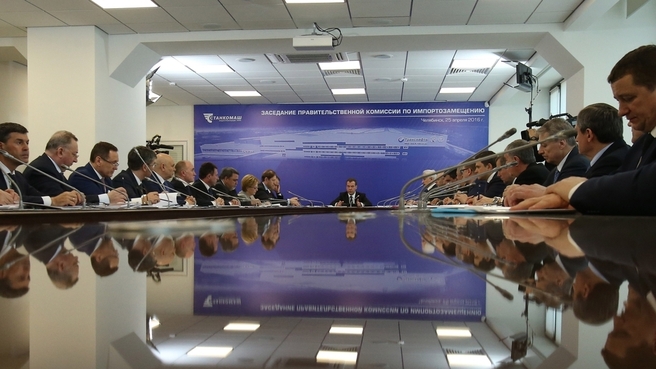Agenda: The implementation of import substitution plans in industry in 2016, the drafting and implementation of similar plans in the energy sector.
Excerpts from Dmitry Medvedev’s opening remarks:
Today’s meeting is devoted to two topics: measures to implement import substitution plans and import substitution in the fuel and energy sector.
Last year was difficult for the industrial sector. Nevertheless, almost all processing industries registered a decrease in the share of imports, although it amounted to a devaluation effect to a large extent. Our measures are generally taking root, and are yielding fruit with a return to growth and the recovery of business activity.
An important result has been launching the process of import substitution in all key sectors. We made an inventory of our technology and equipment needs, developed the legal framework and support tools and adjusted our work plans.
We developed clear technological priorities of reducing dependence on foreign equipment, components, technical services and programmes.
The Industrial Development Fund stepped up its work, and laws on industrial policy and standartisation have been adopted. Now we are establishing the Technological Development Agency to join this work.
Import substitution programmes are supported by the state. In 2015, funding was provided in equal shares from both budgetary and non-budgetary sources. State support amounted to approximately 53.5 billion roubles, and the Industrial Development Fund provided 20 billion roubles. About the same sum was provided by companies from their own and borrowed funds. In some cases, enterprises were additionally provided with government guarantees and subsidies for research and development activities and loan interest payments. A number of enterprises received support through project financing. As a result, over 800 investment projects were launched in 2015.
One of the main goals is to ensure demand in domestic products. Companies with state participation should focus more on products made in Russia in their corporate plans and procurement policy.
In late March, I signed an order to hold the 2nd international exhibition on import substitution. It will take place in Moscow in the middle of September with the support of the Government. This will be a good opportunity to showcase our achievements and industrial innovations and to strike up business contacts. Recently, a decision was adopted to sign the first special investment contract. We need to consider how this mechanism will develop. Evidently, there have to be certain incentives for both regions and enterprises. Several lawmaking initiatives are currently being discussed in parliament, namely that the contract should grant tax privileges and also the possibility for a company to be recognised as the sole supplier when it comes to state purchases.
Another important task is to work out a procedure for refinancing enterprises through attracting special sources, including the Industrial Development Fund, and through getting small and medium-sized businesses involved as widely as possible in the implementation of import substitution plans.
We intend to continue supporting import substitution, including financially. This year, the amount of budget support will remain almost unchanged.
Before the meeting, I visited a new plant that will produce high-capacity oil pumps. This is the first plant in Russia with full-cycle production for such equipment. It’s a vivid example of getting rid of import dependence in oil and gas engineering. A switch to Russian technology and equipment in this area can have a tremendous effect. As regards the maintenance of facilities owned by companies, particularly those hit by sectoral sanctions, there is simply no other choice left.
The share of Russian products in the total volume of purchases carried out by major companies is now around 90 percent. For Transneft, it is almost 91 percent. Our colleagues hope to bring it to around 97 percent over the next five years, and to reduce the share of imported products to just three percent.
This topic is being actively addressed by a special scientific and technical council for the development of oil and gas equipment.
Significantly, the needs and programmes of state-owned companies in the fuel sector should be synchronised with the import substitution plans as much as possible.












